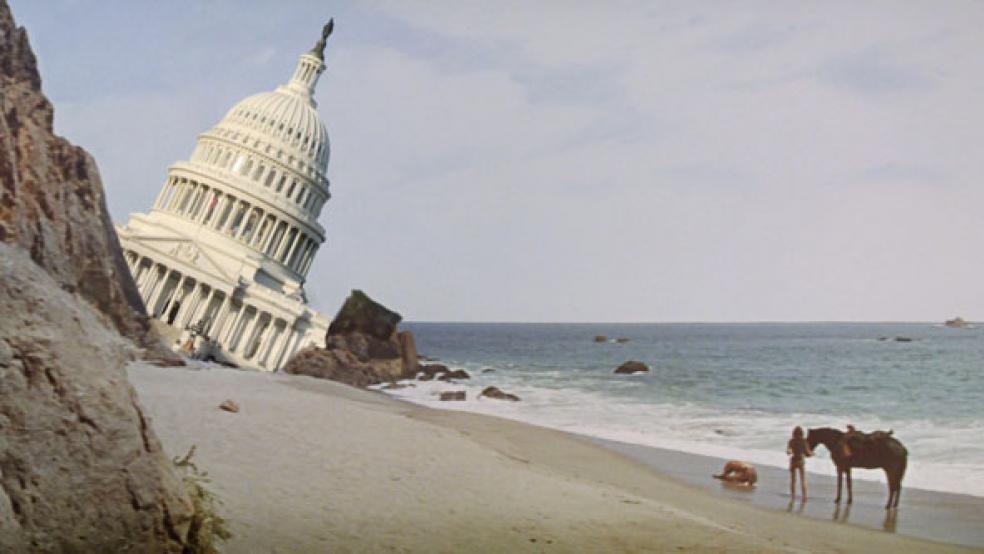In case you haven’t been paying attention, two things happened this week that together demonstrate how profoundly broken democracy is in the U.S.
The Supreme Court ruled on Thursday, in NLRB v. Noel Canning, that President Obama violated the Constitution by appointing members to the National Labor Relations Board while the Senate was in a three-day recess. Obama was trying to provide the NLRB with enough members to actually do its job, against the wishes of Republicans in Congress, who would prefer the agency not exist at all and were effectively shutting it down by refusing to consider new nominees.
Related: Boehner v. Obama Case Might Never Get to Court
Just days earlier, House Speaker John Boehner (R-OH) announced that he intends to sue the president. Boehner is frustrated at the administration’s demonstrated willingness to use executive actions to bypass Congress in enacting his agenda, and feels his only option is to turn to the courts.
These are two sides of the same ugly coin. Congressional Republicans can’t force the president to govern the way they want him to, so they throw as many roadblocks in his way as they possibly can, from creating gridlock to refusing to fill vital government positions.
For his part, Obama can’t force the Congress to legislate the way he wants it to, so he is doing everything in his power to work outside the system, effectively depriving Congress of its rightful role in both legislating and overseeing the executive branch.
The result is that the legislative and executive branches are both trying to exercise authority outside the channels traditionally available to them. This not only gives the impression that each side is overreaching, but creates a system in which the judicial branch, rather than being one of three coequal parts of the government, is now the ultimate authority over decisions it has no business making.
Related: Dems Try to End-Run Boehner on Unemployment Insurance
“Our system of government is structurally paralyzed,” said attorney Philip K. Howard.
Howard, the founder and chairman of the government reform activist group Common Good and the author of several books, including his most recent, The Rule of Nobody, said that from each player’s perspective, what they are doing makes sense.
“The system is designed so that no one can do what’s right,” he said. “In essence, to get anything done you have to either ignore the law or violate the law.”
The president, Howard said, takes extra-legal steps because he feels he can’t accomplish goals or execute his responsibilities otherwise. “Obama is taking [these] actions because he believes he can’t accomplish his goals without being extra-legal.” Similarly, Congress has placed so many restraints on the executive branch that the president is unable to hire and fire personnel at key federal agencies."
Related: In Punishing IRS, GOP Is Harming Honest Taxpayers
“The separation of powers is all oatmeal,” Howard said. “The executive is writing laws, the Congress is dictating how the branch executive manages federal agencies.”
That means legal challenges, such as the one the Supreme Court ruled on Thursday, are inevitable, he said.
Thursday’s Supreme Court decision sharply reined in the president’s ability to fill executive branch positions. It was an authority that was somewhat ill-defined in the past, which at least gave the president some room to maneuver. But no more.
“The bottom line is that decision is a loss for President Obama, who will pass along diminished powers to all his successors,” said John Cooney, former assistant to the solicitor general and deputy general counsel at the Office of Management & Budget during the Reagan administration.
Related: SCOTUS – Your Cellphone Has the Right to Remain Private
Cooney, now an attorney with the Venable firm said the damage to the presidency could have been much worse. While the decision was technically unanimous, four of the nine justices who signed a concurrent opinion would have placed even sharper restrictions on the president.
“The office of the presidency dodged a bullet today,” he said.
If the White House was damaged today, Boehner’s announcement earlier in the week that he would file a lawsuit against the president revealed the shrunken authority of the Speaker of the House, who has historically been a towering figure in Washington.
Related: Time to Eliminate Congress’s Yearly 'Dog Fur' Report?
It’s hard to imagine Tip O’Neill or Sam Rayburn going hat-in-hand to a federal judge in an effort to make the president show more deference to the legislative branch, but that is what the office has been reduced to today.
“So some federal judge somewhere is going to run the country,” said Common Good’s Howard. “What’s going on in Washington has no relationship to the democracy the framers intended.”
Top Reads from The Fiscal Times:





